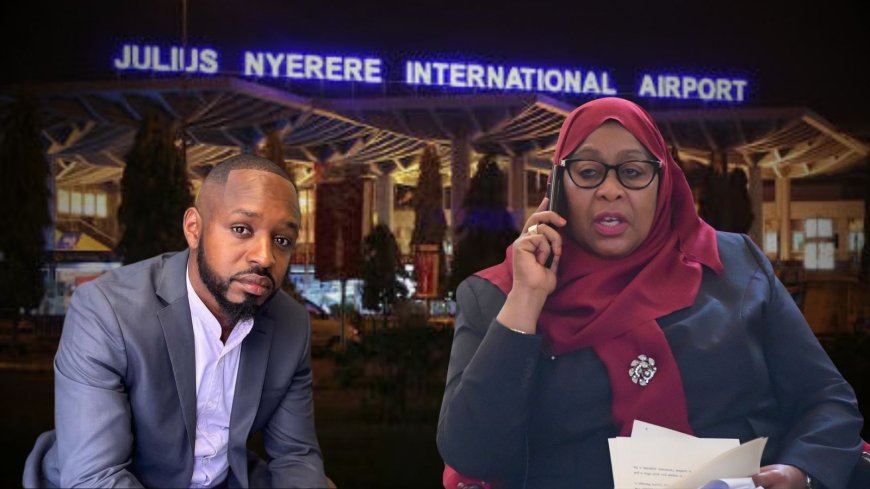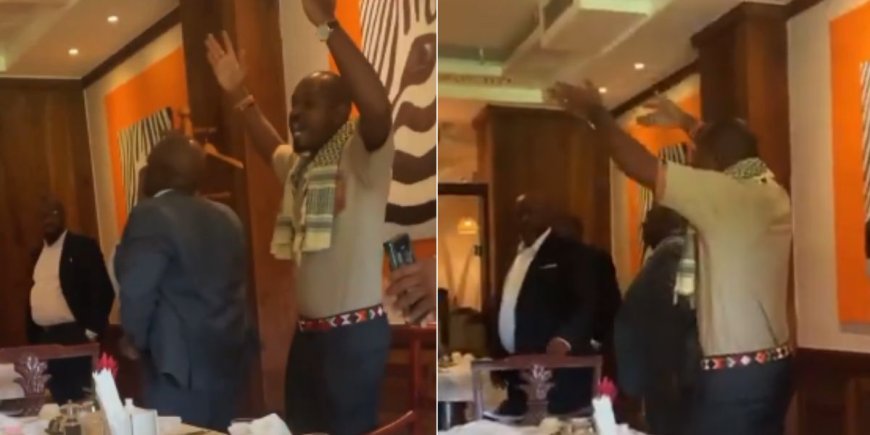Tanzania Deports Boniface Mwangi: Kenya Govt Reports
Mwangi was reported missing on Monday after flying to Tanzania to attend a court hearing for opposition figure Tundu Lissu.

Activist Boniface Mwangi, who had been missing for over three days, has been found alive in Ukunda, his family confirmed on Thursday, May 22.
Prime Cabinet Secretary and Foreign Affairs Cabinet Secretary (CS) Musalia Mudavadi also confirmed his release through his spokesperson, Viral Tea has learnt. The activist was deported by road and abandoned in Ukunda, Kwale County.
While proof of life is yet to be confirmed, Mwangi's lawyer, James Wanjeri, stated that the activist has been taken to the hospital for medical evaluation.
Mwangi was reported missing on Monday after flying to Tanzania to attend a court hearing for opposition figure Tundu Lissu.

Collage of Boniface Mwangi, President Samia Suluhu and Julius Nyerere International Airport in Tanzania. /VIRAL TEA KE
The developments come moments after the Kenyan government claimed that Tanzanian officials had not shared any details about Mwangi's whereabouts, a matter that almost ignited a diplomatic clash between the two East African Community (EAC) nations.
Kenya’s Ministry of Foreign Affairs claimed they had repeatedly tried to contact Tanzanian authorities to locate Mwangi but did not receive any response. This came after Mwangi was reportedly detained in Dar es Salaam on Monday morning for obstruction and entering the country without proper documentation.
In a formal letter to Tanzania’s East African Cooperation ministry, Kenya expressed frustration over the lack of updates and raised concerns about Mwangi’s well-being.
"The Ministry of Foreign and Diaspora Affairs of the Republic of Kenya presents its compliments to the Ministry of Foreign Affairs and East African Cooperation of the United Republic of Tanzania and has the honour to express its deep concern regarding the apprehension of Mr Boniface Mwangi, a Kenyan citizen, Passport No. BK 472892, being held by the United Republic of Tanzania authorities," part of the statement read.
"The Ministry notes that, despite several requests, officials of the Government of Kenya have been denied consular access and information to Mr. Mwangi. The Ministry is also concerned about his health, overall wellbeing and the absence of information regarding his detention."
In response to the situation, the Kenyan government said it had no choice but to invoke the Vienna Convention on Consular Relations (1963), which guarantees that consular officials can freely communicate with and access their nationals in a foreign country.
The treaty also grants consular officers the right to visit detained citizens, speak with them, and help secure legal support—rights that Kenya claims have been denied in Boniface Mwangi’s case.
As a result, Kenya’s Ministry of Foreign Affairs has called on Tanzania to "expeditiously and without delay facilitate consular access to or release of Mwangi, in accordance with international legal obligations and diplomatic norms."
"The Government of Kenya reaffirms its commitment to the cordial bilateral relations that exist between the two countries and expresses the hope that this matter will be resolved swiftly and amicably, in the spirit of regional cooperation and mutual respect," the statement continued.







